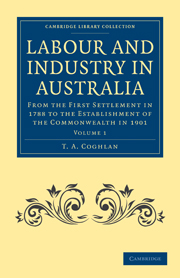 Labour and Industry in Australia
Labour and Industry in Australia Book contents
- Frontmatter
- PREFACE
- Contents
- PART I FROM THE FOUNDATION OF SETTLEMENT TO THE CROSSING OF THE MOUNTAINS
- I INTRODUCTION TO THE FIRST PERIOD
- II THE ASSIGNMENT SYSTEM
- III MUSTERS
- IV WAGES AND WORKING HOURS
- V THE CURRENCY
- VI LAND POLICY
- VII THE GENESIS OF THE WOOL INDUSTRY IN AUSTRALIA
- VIII THE INDUSTRIES OF THE PERIOD
- IX TRADE AND PRICES
- PART II FROM THE CROSSING OF THE MOUNTAINS TO THE ABOLITION OF THE ASSIGNMENT SYSTEM
- PART III FROM THE ABOLITION OF THE ASSIGNMENT SYSTEM TO THE DISCOVERY OF GOLD
- PART IV FROM THE DISCOVERY OF GOLD TO THE INTRODUCTION OF FREE SELECTION OF LAND BEFORE SURVEY
IV - WAGES AND WORKING HOURS
Published online by Cambridge University Press: 05 August 2011
- Frontmatter
- PREFACE
- Contents
- PART I FROM THE FOUNDATION OF SETTLEMENT TO THE CROSSING OF THE MOUNTAINS
- I INTRODUCTION TO THE FIRST PERIOD
- II THE ASSIGNMENT SYSTEM
- III MUSTERS
- IV WAGES AND WORKING HOURS
- V THE CURRENCY
- VI LAND POLICY
- VII THE GENESIS OF THE WOOL INDUSTRY IN AUSTRALIA
- VIII THE INDUSTRIES OF THE PERIOD
- IX TRADE AND PRICES
- PART II FROM THE CROSSING OF THE MOUNTAINS TO THE ABOLITION OF THE ASSIGNMENT SYSTEM
- PART III FROM THE ABOLITION OF THE ASSIGNMENT SYSTEM TO THE DISCOVERY OF GOLD
- PART IV FROM THE DISCOVERY OF GOLD TO THE INTRODUCTION OF FREE SELECTION OF LAND BEFORE SURVEY
Summary
When the assignment system came into force as detailed in a foregoing chapter, it was not the intention of the Governor that wages should be paid either to men working for the State or to those in assigned service, and it was not until it was found expedient to work the convicts beyond the ordinary hours, that the question of wages arose. In determining the amount of work required from his convict subjects, Governor Phillip took as a guide his experience of English labourers, but he had also to consider the character of men for whom he was legislating. He did indeed consider it, but not in the way an economist would have suggested. The men were ill-nurtured, and physically and mentally depraved, and these characteristics would seem to have demanded a mitigated task as compared with what a normal man might be called upon to perform. But Phillip was not an economist. He had generous feelings towards his subjects, but he was also a moralist, and it was in this last-mentioned capacity that he proceeded to determine the hours that his men should labour.
His laws were all conceived in the spirit of the primal curse, which designated work a punishment, the life of man a warfare, and his time here below probation, to be spent in weariness and sorrow.
- Type
- Chapter
- Information
- Labour and Industry in AustraliaFrom the First Settlement in 1788 to the Establishment of the Commonwealth in 1901, pp. 48 - 66Publisher: Cambridge University PressPrint publication year: 2011First published in: 1918
